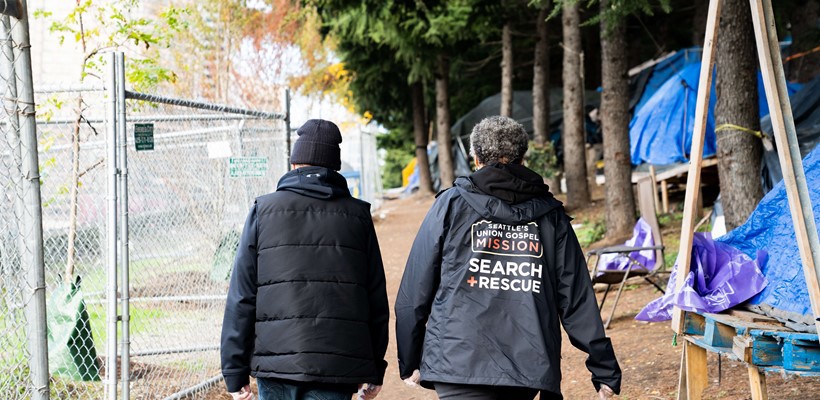Mental Health Outreach
Seattle's Union Gospel Mission - April 19 2023Outreach, Mental Health, Homelessness

“Hope is the difference in perspective”
A large number of our homeless neighbors on the streets are struggling with mental health issues.
“Our estimates are probably around 95 to 98%,” says Brian Chandler, the Mission’s Director of Outreach. “I mean, we’re talking any level. We’re talking people that are discouraged, dealing with depression – all the way up to paranoia and schizophrenia.”
When people suffer with mental health problems, they often try to make themselves feel better by finding relationships and commonality with people who make them feel normal. In doing so, they attach themselves to others who are also struggling. The “pull to stay on the streets becomes even stronger,” says Brian.
The inner voices tell people struggling with mental health issues that they are failures – that that they will never amount to anything. Eventually, people just give up. They lose trust in other people and in systems.
Our approach
Breaking through is difficult and can only be done in the context of consistent, healthy, strong relationships. As Brian puts it, “Healthy relationships that don’t give up on people. Healthy relationships that show up all the time, no matter what they say, no matter what they do. Eventually, we begin to build trust again.”
When Mission staff meet someone dealing with mental health issues, we first try to determine the level of the problem. “If it’s something mild, depression, discouragement, something of that nature … we can put into practice practical tools,” explains Brian. The goal is to help people see their struggles from a fresh perspective in order to give them hope.
If the person’s issues are more serious, staff goes into what the Mission calls “de-escalation training.” The goal is to keep people calm while reaching out to crisis intervention teams to help them.
Restoring hope
“The ultimate issue is the gospel,” Brian says. “What’s going on in the inside of someone’s soul.”
In order to help people really heal, they need hope. Addressing the mental health issues helps restore that hope. “We’re diminishing those feelings. We’re diminishing the feeling of dread and discouragement and hopelessness,” Brian says.
One important thing to remember is everyone deals with mental health issues from time to time. This perspective helps Mission staff reach a place of empathy with our homeless neighbors. That enables us to ask ourselves, “How do I feel when I get discouraged? How do I feel when I get depressed? What gets me out of that?” Then we are better able to help people get to a place of hope.
“Hope is the difference in perspective,” Brian says. “If you can give anyone hope, no matter what level of mental health you’re dealing with, hope overcomes all things and that’s amazing.”
You can help bring hope to people struggling with mental illness by making a monthly gift to the Mission.







